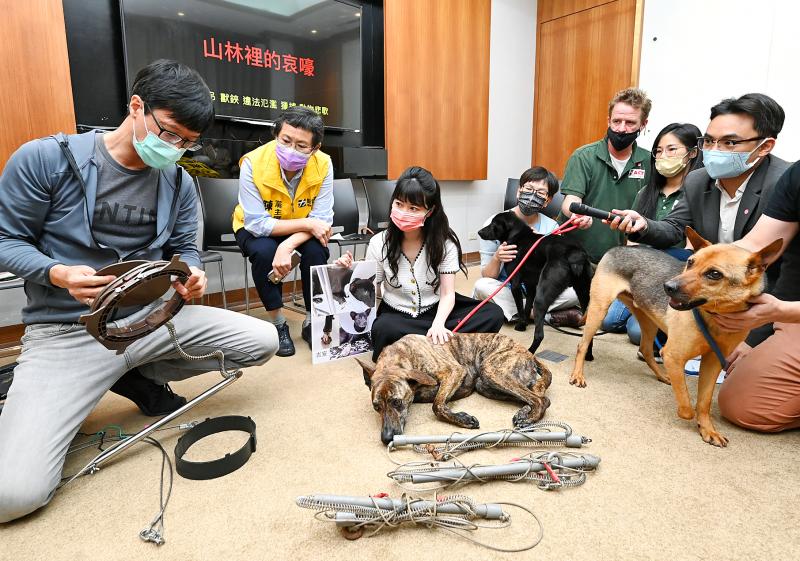The manufacture and use of animal traps that mutilate their catch should be banned via legal amendments, animal protection groups said yesterday.
Taiwan People’s Party (TPP) Legislator Tsai Pi-ru (蔡壁如) also urged the government to make efforts to prevent further mutilation of animals that occurs every day.
Animal Care Trust (ACT) secretary-general Hsu Juo-ching (徐若菁) said the group often found animals bloodied by traps during investigative missions, adding that the number of stray dogs on Yangmingshan (陽明山) with fewer than four functioning legs is proof of the dangers of such traps.

Photo: Tien Yu-hua, Taipei Times
These traps are used to keep animals away from farms, but are ineffective, Hsu said, adding that farmers should adopt more humane methods of protecting their land.
A child could step into a boar trap and be hung from a tree, which would make Taiwanese think twice about such traps, ACT founder Sean McCormack said.
Government measures to modify trap designs to reduce their harm cannot be enforced due to legal loopholes, Taiwan Animal Protection Monitor Network secretary-general Ho Tsung-hsun (何宗勳) said.
Ho also urged the Executive Yuan to review the Forestry Bureau’s proposed amendments to Article 21 of the Wildlife Conservation Act (野生動物保護法), which were submitted a year ago and would ban the use of all traps.
New Power Party (NPP) Chairwoman Chen Jiau-hua (陳椒華) said that traps permanently maim animals, and the government should either limit the legal uses of such devices or ban them completely.
Chinese Nationalist Party (KMT) Legislator Hung Meng-kai (洪孟楷) said that if people would not tolerate humans being caught in these types of traps, they have no right to use them on animals.
Either people should be licensed to use these traps, or their use should be reviewed on a case-by-case basis, he said.
Separately, Forestry Bureau staff demonstrated redesigned animal traps, which allow for adjustable diameters and pressure plates, preventing bears and leopard cats from activating the traps.
The new traps are designed to meet farmers’ needs to deter animals, and old traps should be traded in for the new model, bureau staff said.

An essay competition jointly organized by a local writing society and a publisher affiliated with the Chinese Communist Party (CCP) might have contravened the Act Governing Relations Between the People of the Taiwan Area and the Mainland Area (臺灣地區與大陸地區人民關係條例), the Mainland Affairs Council (MAC) said on Thursday. “In this case, the partner organization is clearly an agency under the CCP’s Fujian Provincial Committee,” MAC Deputy Minister and spokesperson Liang Wen-chieh (梁文傑) said at a news briefing in Taipei. “It also involves bringing Taiwanese students to China with all-expenses-paid arrangements to attend award ceremonies and camps,” Liang said. Those two “characteristics” are typically sufficient

A magnitude 5.9 earthquake that struck about 33km off the coast of Hualien City was the "main shock" in a series of quakes in the area, with aftershocks expected over the next three days, the Central Weather Administration (CWA) said yesterday. Prior to the magnitude 5.9 quake shaking most of Taiwan at 6:53pm yesterday, six other earthquakes stronger than a magnitude of 4, starting with a magnitude 5.5 quake at 6:09pm, occurred in the area. CWA Seismological Center Director Wu Chien-fu (吳健富) confirmed that the quakes were all part of the same series and that the magnitude 5.5 temblor was

The brilliant blue waters, thick foliage and bucolic atmosphere on this seemingly idyllic archipelago deep in the Pacific Ocean belie the key role it now plays in a titanic geopolitical struggle. Palau is again on the front line as China, and the US and its allies prepare their forces in an intensifying contest for control over the Asia-Pacific region. The democratic nation of just 17,000 people hosts US-controlled airstrips and soon-to-be-completed radar installations that the US military describes as “critical” to monitoring vast swathes of water and airspace. It is also a key piece of the second island chain, a string of

The Central Weather Administration has issued a heat alert for southeastern Taiwan, warning of temperatures as high as 36°C today, while alerting some coastal areas of strong winds later in the day. Kaohsiung’s Neimen District (內門) and Pingtung County’s Neipu Township (內埔) are under an orange heat alert, which warns of temperatures as high as 36°C for three consecutive days, the CWA said, citing southwest winds. The heat would also extend to Tainan’s Nansi (楠西) and Yujing (玉井) districts, as well as Pingtung’s Gaoshu (高樹), Yanpu (鹽埔) and Majia (瑪家) townships, it said, forecasting highs of up to 36°C in those areas